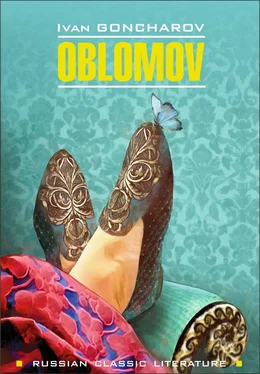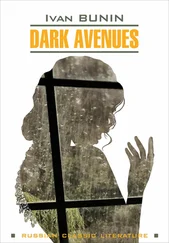Once, however, a man had been found lying in a ditch by the bridge outside a village, evidently a member of a co-operative group of workmen who had passed by on their way to the town. The boys were the first to discover him, and they ran back terrified to the village with the news that some terrible serpent or werewolf was lying in a ditch, adding that he had chased them and nearly eaten Kuzka. The braver souls among the peasants armed themselves with pitchforks and axes and went in a crowd to the ditch.
«Where are you off to?» The old men tried to stop them. «Think yourselves stout fellows, do you? What do you want there? Leave it alone, no one’s driving you».
But the peasants went, and about a hundred yards from the spot began calling to the monster in different voices, and as there was no reply, they stopped, then moved on again. A peasant lay in the ditch, leaning his head against its side; a bundle and a stick with two pairs of bast-shoes tied on it, lay beside him. They did not venture near him or touch him.
«Hey you, there!» they shouted in turn, scratching their heads or their backs. «What’s your name? Hey, you! What do you want here?»
The stranger tried to raise his head but could not; evidently he was either ill or very tired. One peasant nearly brought himself to touch him with his pitchfork.
«Don’t touch him! Don’t touch him!» many of the others cried. «How do we know what sort of a man he is? He hasn’t said a word. He may be one of them – don’t touch him, lads!»
«Let’s go», some said. «Come on now: he isn’t one of ours, is he? He’ll only bring us trouble!»
And they all went back to the village, telling the old men that a stranger was lying there who would not speak and goodness only knows what he was up to.
«Don’t have anything to do with him if he is a stranger», the old men said, sitting on the mound of earth beside their cottages, with their elbows on their knees. «Let him do as he likes! You shouldn’t have gone at all!»
Such was the spot where Oblomov suddenly found himself in his dream. Of the three or four villages scattered there, one was Sosnovka and another Vavilovka, about a mile from each other. Sosnovka and Vavilovka were the hereditary property of the Oblomov family and were therefore known under the general name of Oblomovka. The Oblomov country seat was in Sosnovka. About three and a half miles from Sosnovka lay the little village of Verkhlyovo, which had once belonged to the Oblomov family but which had long since passed into other hands, and a few more scattered cottages which went with it. This village belonged to a rich landowner who was never to be seen on his estate, which was managed by a German steward.
Such was the whole geography of the place.
Oblomov woke up in the morning in his small bed. He was only seven. He felt light-hearted and gay. What a pretty, red-cheeked, and plump boy he was! He had such sweet, round cheeks that were the envy of many a little rogue who would blow up his own on purpose, but could never get cheeks like that. His nurse was waiting for him to wake up. She began putting on his stockings, but he did not let her; he played about, dangling his legs. His nurse caught him, and they both laughed. At last she succeeded in making him get up. She washed his face, combed his hair, and took him to his mother. Seeing his mother, who had been dead for years, Oblomov even in his sleep thrilled with joy and his ardent love for her; two warm tears slowly appeared from under his eyelashes and remained motionless. His mother covered him with passionate kisses, then looked at him anxiously to see if his eyes were clear, if anything hurt him, asked the nurse if he had slept well, if he had waked in the night, if he had tossed in his sleep, if he had a temperature. Then she took him by the hand and led him to the ikon. Kneeling down and putting her arm round him, she made him repeat the words of a prayer. The boy repeated them after her absent-mindedly, gazing at the window, through which the cool of the morning and the scent of lilac poured into the room.
«Are we going for a walk to-day, Mummy?» he suddenly asked in the middle of the prayer.
«Yes, darling», she replied hurriedly, without taking her eyes off the ikon and hastening to finish the holy words.
The boy repeated them listlessly, but his mother put her whole soul into them. Then they went to see his father, and then they had breakfast.
At the breakfast table Oblomov saw their aunt, an old lady of eighty; she was constantly grumbling at her maid, who stood behind her chair waiting on her and whose head shook with age. Three elderly spinsters, his father’s distant relations, were also there, as well as his father’s slightly mad brother, and a poor landowner by the name of Chekmenev, the owner of seven serfs, who was staying with them, and several old ladies and old gentlemen. All these members of the Oblomov retinue and establishment picked up the little boy and began showering caresses and praises on him; he had hardly time to wipe away the traces of the unbidden kisses. After that they began stuffing him with rolls, biscuits, and cream. Then his mother hugged and kissed him again and sent him for a walk in the garden, the yard, and the meadow, with strict instructions to his nurse not to leave the child alone, not to let him go near the horses, the dogs, and the goat or wander too far from the house, and, above all, not to let him go to the ravine, which had a bad name as the most terrible place in the neighbourhood. Once they found a dog there which was reputed to be mad only because it ran away and disappeared behind the hills when attacked with pitchforks and axes; carcasses were thrown into the ravine, and wolves and robbers and other creatures which did not exist in those parts or anywhere else in the world were supposed to live there.
The child did not wait for his mother to finish her warnings; he was already out in the yard. He examined his father’s house and ran round it with joyful surprise, as though he had never seen it before: the gates which leaned to one side; the wooden roof which had settled in the middle and was overgrown with tender green moss; the rickety front steps; the various outbuildings and additions built on to it, and the neglected garden. He was dying to climb on to the projecting gallery which went all round the house and to have a look at the stream from there; but the gallery was very old and unsafe, and only the servants were allowed to go there – nobody else used it. He didn’t heed his mother’s prohibition and was already running to the inviting steps when his nurse appeared and succeeded in catching him. He rushed away from her to the hay-loft, intending to climb up the steep ladder leading to it, and she had no sooner reached the hay-loft than she had to stop him climbing up the dovecote, getting into the cattle yard and – Lord forbid – the ravine.
«Dear me, what an awful child – what a fidget, to be sure!» his nurse said. «Can’t you sit still for a minute, sir? Fie, for shame!»
The nurse’s days – and nights – were one continuous scurrying and dashing about: one moment in agony, another full of joy, afraid that he might fall and hurt himself, deeply moved by his unfeigned childish affection, or vaguely apprehensive about his distant future – this was all she lived for, these agitations warmed the old woman’s blood and sustained her sluggish existence which might otherwise have come to an end long before.
The child, however, was not always so playful; sometimes he suddenly grew quiet and gazed intently at everything as he sat beside his nurse. His childish mind was observing closely all that was going on around him; these impressions sank deeply into his soul, and grew and matured with him.
It was a glorious morning; the air was cool; the sun was still low. Long shadows fell from the house, the trees, the dovecote, and the gallery. The garden and the yard were full of cool places, inviting sleep and day-dreaming. Only the rye-fields in the distance blazed and shimmered, and the stream sparkled and glittered in the sun so that it hurt one’s eyes to look at it.
Читать дальше












